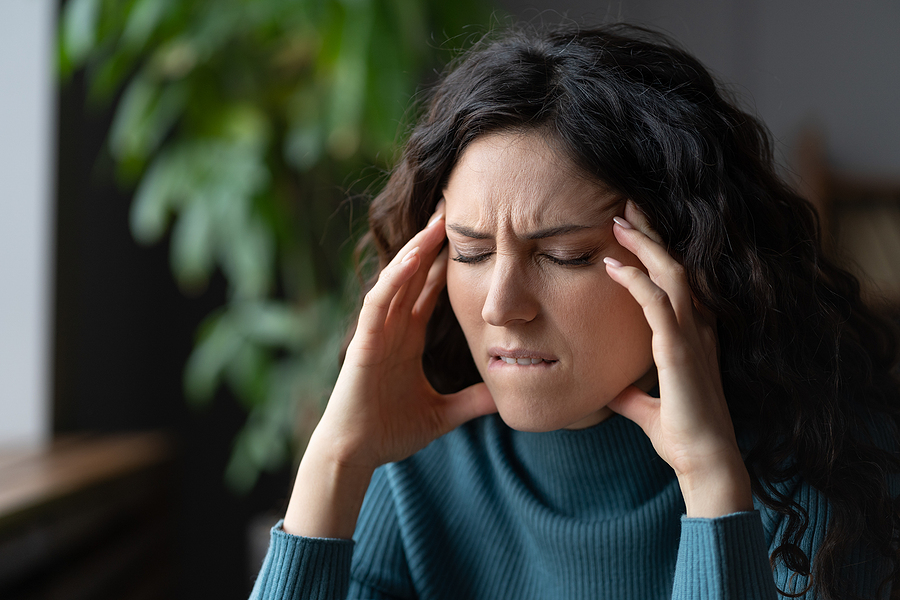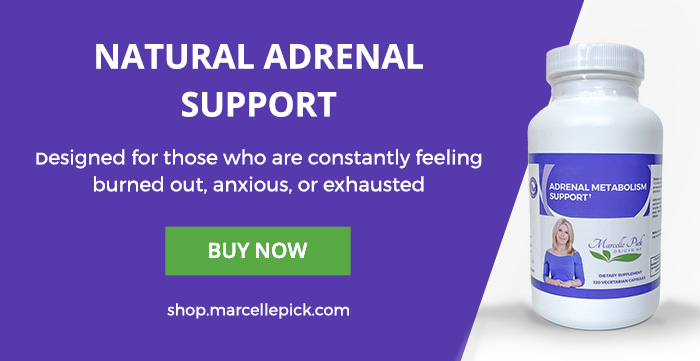Updated 10/15/2023
“My friend told me these cured her adrenal fatigue – but I’ve been using them for three weeks, and nothing’s changed. Why not?”
That’s the question Sharon, who’d been diagnosed with adrenal fatigue herself, asked when she came to see me, with a bottle of CoQ10 capsules, a compound with powerful antioxidant properties that has been shown to help with energy and reduce the risk of certain conditions like heart disease, in her hand.
Sharon was totally confused, because she had started taking this supplement thinking it was a “miracle cure,” but didn’t feel any difference.
She also said that when she’d mentioned the whole situation to her family doctor, her family doctor told her adrenal fatigue wasn’t even real! Sharon had no idea what to believe – and when she did an online search, she was left with more questions than answers!
It’s no wonder she was confused. There’s a lot of debate about adrenal fatigue, and what helps. I can help clear some misconceptions up – starting with the idea that there’s a magic nutrient that will take all your symptoms away. While there are many supplements that can help with adrenal fatigue, no one nutrient can do the whole job on its own!
As for whether adrenal fatigue is “real,” I can assure you it is – and I’ll talk more about that in a minute. But what I really want you to know is that there are so many myths out there about adrenal health, which can make it really confusing for women who are trying to get better!
I want to help to bring more clarity to these areas by dispelling some of the most pervasive myths about adrenal fatigue, so that you can focus on truly understanding what’s going on in your body, and healing holistically.
The 4 Biggest Myths About Adrenal Fatigue
Myth #1: Adrenal fatigue isn’t a “real” condition
I’ve talked about this before, but it always bears repeating! The question of whether or not adrenal fatigue is “real” comes up all the time, even among women who are actively working on restoring their adrenal health. They hear it questioned by the media, their doctor, or even their friends or family, and despite their uncomfortable symptoms, they start to doubt themselves. But in my functional medicine practice, I see and treat adrenal fatigue all the time, and I help women get back to their healthiest selves with the help of my adrenal fatigue protocols.
So why is it such a challenge to put this question to rest once and for all? There are a few factors, but it really boils down to a lack of understanding.
Conventional medicine continues to not recognize adrenal fatigue as a real problem. This is in part because of a name that is not necessarily precise (your adrenals don’t wear out, as suggested by the term fatigue – they just stop functioning as they should), and in part because conventional medicine generally struggles with conditions that aren’t black and white.
In between the conventional medical diagnoses of Addison’s disease (adrenal insufficiency) and Cushing’s syndrome (hypercortisolism) is a wide spectrum of stress-induced adrenal dysfunction that deserves a whole lot of overdue recognition.
I don’t think that any physician would argue that stress influences hormonal and overall health! But most of the time, the field of conventional medicine is simply unequipped to really dig into a complex, highly individualized history and treatment plan for a spectrum or “grey area” condition like adrenal fatigue.
Like so many of the conditions we see in functional medicine, adrenal fatigue presents differently in everyone. There are different causes, different symptoms, different levels of severity, and different lab results– since the fluctuation of hormones related to adrenal function can be complex.
Here’s the bottom line: just about all of the women I work with have some degree of adrenal fatigue or dysfunction, and that’s real! When women are experiencing symptoms like exhaustion, anxiety, depressed mood, brain fog, weight loss resistance, or any number of other persistent and “unexplained” concerns, there is usually something going on with adrenal function.
It can also be helpful to look at adrenal fatigue as just one aspect of what’s going on. For example, a woman may be diagnosed with hypothyroidism, but her health may not be improving as she would hope with thyroid medication. In cases like this, there’s often an adrenal component too, because adrenal function influences all of our hormones! So, restoring adrenal function can be an important step when it comes to healing from other conditions, too. We want to look at the whole person, and remember that in our bodies, everything is connected!
Myth #2: Adrenal fatigue only occurs within an extremely high stress lifestyle
It is true that stress is at the root of adrenal dysfunction, but it’s important to understand what stress really means.
When you hear the word “stress”, what do you think of? So often when this question comes up, people conjure up images of things like running around with a briefcase in a high pressure corporate world, or fighting fires, or dealing with a personal tragedy, or having non-stop responsibilities to manage. And believe me, I also know how much stress typical women are under, between balancing family responsibilities, work, and their own health and lives. All of this is stress, and I totally get it!
But it’s important to understand that there’s a lot of underlying stress in the body that may not be so obvious. “Perceived stress”, or what you might call emotional, mental, or psychological stress, matters just as much!
For our bodies, stress also includes things like inflammatory foods, processed foods, lack of sleep, excessive exercise, low grade infections, exposure to toxins in cleaning products or personal care products, viruses, time spent on social media, the use of certain prescription medications; the list goes on and on.
The truth is, your endocrine system and adrenal glands really don’t distinguish between fighting fires, sending a nerve wracking email, and eating a cheeseburger: it’s all stress, and it all contributes to adrenal fatigue.
I’m not trying to alarm anybody, because I know this can make it seem like stress is totally unavoidable, and of course, that’s true to a point! (And don’t worry, a little bit of stress is normal and okay – even necessary). But one place where so many women can get stuck along their adrenal recovery journey is by focusing exclusively on the “obvious” stressors without making changes when it comes to diet and lifestyle stressors.
For most women, adrenal fatigue has been brought on by a combination of different factors. Sometimes, perceived stress or a stressful day-to-day life is the most prominent, but this is not always the case. So always keep in mind that adrenal fatigue can really affect anybody, and that stressors really are all around us (but many of them are within your control!).
Myth #3: Adrenal fatigue will resolve itself over time
The idea that adrenal fatigue will just go away on its own probably comes from the same place as the idea that adrenal fatigue only pops up when a person has an extraordinarily stressful life. It’s a concept that needs to be approached with the same degree of big-picture thinking.
I once saw a patient, Ginny, who had adrenal fatigue that was likely brought on (or exacerbated by) a big promotion she’d received at work. There was a time when she had really loved her job, but when she was launched into a management role, she suddenly found herself dreading getting up at 5:30 every morning, racing to the office, and leading high pressure meetings and projects until long after the sun went down. She no longer had time for the parts of her work that she loved, and she felt completely out of sorts. She said she was feeling anxious all the time, and becoming more and more run down and tired. She guzzled coffee all day long, constantly craving sugar, and she told me that her digestion was totally out of whack.
Ginny realized that the new job was just not right for her, so she had stepped down after a year, returning to a role that had always made her feel happy and fulfilled. But she still wasn’t feeling like her old self, which is why she came to see me. She still woke up exhausted, she still felt bloated and irritable throughout the day, she still felt run down. She had even taken a week-long, relaxing, beach vacation, but that hadn’t done the trick either!
So, what was going on? Well, let me just start by saying thatGinny definitely did the right thing by walking away from a job that was making her feel that awful! Reducing day-to-day stress and making time to take care of yourself and unwind is an absolutely essential part of healing from adrenal fatigue and maintaining balance.
The thing is, Ginny had worked her high-stress job for a year, and in that time, she had also been drinking a ton of coffee, sleeping for no more than 5 or 6 hours a night, checking her email around the clock, eating fast food lunches on the road, and often relying on sugary foods to keep going. All of that stress took a toll on her body, leading to adrenal fatigue, which meant overall hormonal dysfunction, which also led to gut dysbiosis, new food sensitivities, and some immune system dysfunction.
So, while removing herself from the most stressful situation in her life was a huge first step, I explained that her condition hadn’t developed overnight, and it wouldn’t disappear overnight either. She would next have to focus on modifying her other lifestyle factors, and repairing and restoring her hormonal function, adrenal health, gut health, and immune system function.
I hope that doesn’t sound intimidating, because it really is possible to do this, and it’s possible to do it naturally! The important thing is understanding that adrenal fatigue, especially if it has progressed into a later stage, won’t go away on its own, even if the high stress situation goes away.
You can read more about how to treat adrenal fatigue naturally in my article here.
Myth #4: Adrenal fatigue is all about cortisol
If you’ve read or heard anything about adrenal fatigue, I’m sure you’re at least somewhat familiar with cortisol, often referred to as the “stress hormone”. The adrenal glands produce and release cortisol in response to stress (and in a natural cycle throughout the day). When there is adrenal dysfunction, cortisol production and levels go out of whack. Depending on what stage of adrenal fatigue you’re in, this might mean high, low, or fluctuating cortisol levels.
But there’s a lot more to adrenal fatigue than cortisol! Here’s the thing. When the demand for cortisol is consistently high, something happens to the rest of our hormones, too. Remember, the adrenal glands are responsible for more than 50 hormones – not just cortisol – and hormones have to work together in harmony. So, when cortisol demand is too high for too long, we divert resources away from producing other hormones– namely, DHEA, which impacts the production of sex hormones like estrogen and testosterone.
When I’m looking at test results related to adrenal fatigue, I’m looking at much more than whether cortisol levels are high, low, or “normal”. Actually, one of the most important things to look at in order to understand what’s going on with a woman’s adrenal function and overall health is the ratio between cortisol and DHEA. Balancing cortisol and DHEA is so crucial, and it’s not talked about nearly enough when we talk about adrenal fatigue.
We also want to look at levels of other hormones, and patterns of hormone fluctuation throughout the day. Remember, adrenal fatigue is not a black and white condition: hormonal balance is complex, and everything in the body is connected, which is why it’s important to work with a practitioner who is experienced in this area.
I went through all of these myths – and the realities – with Sharon, and helped her recognize that the one bottle of supplements she’d tried wasn’t enough to take care of her adrenal issues. With that understanding, she really recognized what was happening in her body and with her hormones, so she could focus her attention on the changes that could make a difference for her. And it worked! I have seen so many women restore their adrenal health and enhance their well-being naturally, and it’s possible for you, too!








